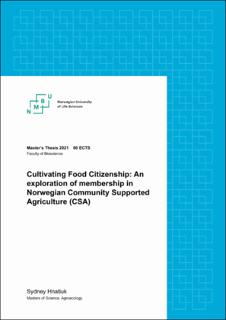| dc.contributor.advisor | Lieblein, Geir | |
| dc.contributor.author | Hnatiuk, Sydney Keera | |
| dc.coverage.spatial | Norway | en_US |
| dc.date.accessioned | 2021-07-02T12:00:08Z | |
| dc.date.available | 2021-07-02T12:00:08Z | |
| dc.date.issued | 2021 | |
| dc.identifier.uri | https://hdl.handle.net/11250/2763113 | |
| dc.description.abstract | The dominant food system is ripe with challenges which are contributing to the degradation of social and natural systems around the world. Transformative actions are required to amend the current situation, and actors all along the food system have a role in cultivating these changes. This study investigates an opportunity for the individuals to participate in food system transformation through membership in Community Supported Agriculture (CSA). Norwegian CSAs are developed around principles of closeness and familiarity with one’s food and its production. As such, members are highly engaged in their CSA socially, democratically and through mandatory and voluntary labour. This study seeks to understand how this level of engagement in a CSA might facilitate the adoption of practices consistent with food citizenship. This was done through a combination of participant observation on four CSAs and interviews with actively engaged members from each. The conceptual theory of food citizenship and social practice theory were applied to tease out relevant practices and to better understand how they were cultivated and maintained. The study found that members of the CSAs had thought about and reflected on challenges within the dominant food system with which they were unsatisfied. Additionally, members commitment to CSA was motivated both intrinsically and extrinsically as they sought to find an alternative food acquisition method from the dominant food system. Four relevant member practices engaged which either embodied the spirit of food citizenship or contributed to cultivating its practice. Those practices are; redefining roles within the food system, acquiring new knowledge and skills, cultivating communities and enacting relational reflexivity. The study found that Norwegian CSAs were effective at cultivating food citizenship to the degree of the local food system but were limited by seasonality. As such if CSAs aim to inspire and cultivate a greater depth of food citizenship in their members, practices which encourage year-round connections within the community and regional food system would need to be developed. This study may aid in our understanding of how practices consistent with food citizenship are cultivated on CSAs and help guide the future development of CSAs as leverage points for food system transformation. | en_US |
| dc.language.iso | eng | en_US |
| dc.publisher | Norwegian University of Life Sciences, Ås | en_US |
| dc.rights | Attribution-NonCommercial-NoDerivatives 4.0 Internasjonal | * |
| dc.rights.uri | http://creativecommons.org/licenses/by-nc-nd/4.0/deed.no | * |
| dc.title | Cultivating food citizenship : an exploration of membership in Norwegian Community Supported Agriculture (CSA) | en_US |
| dc.type | Master thesis | en_US |
| dc.description.localcode | M-AE | en_US |

